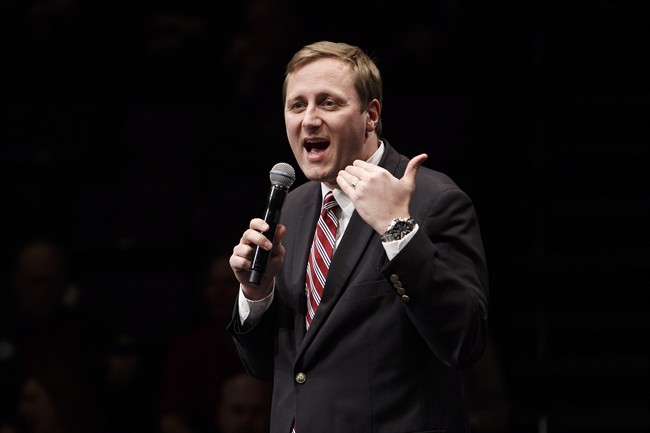The Conservative leadership contest is finally entering into the last leg of the race as the deadline to sign up new members has passed. Members will vote for a new leader on May 27.

A lot of focus has been on the xenophobic tenor of some of the leading – and not so leading – candidates, and for good reason. The hysteria that surrounded the anti-Islamophobia motion, M-103, was disappointing to say the least. Once it came to light that the Conservatives had already voted in favour of a similar motion back in October, one that condemned Islamophobia without specifically defining the term, it made their arguments against M-103 that much weaker.
But if you had believed some of the rhetoric being espoused by the likes of Kellie Leitch, Maxime Bernier, Brad Trost and others, you would have thought that as soon as the non-binding gesture of parliamentary goodwill had passed, it meant the death of free speech as we knew it, with the full implementation of sharia law here in Canada.
A whole week has gone by since the passage of M-103 and as far as I’m aware, Canadian law and jurisprudence still reign supreme, and I have yet to be forced into a niqab.
- Posters promoting ‘Steal From Loblaws Day’ are circulating. How did we get here?
- Video shows Ontario police sharing Trudeau’s location with protester, investigation launched
- Canadian food banks are on the brink: ‘This is not a sustainable situation’
- Solar eclipse eye damage: More than 160 cases reported in Ontario, Quebec
So while the Conservatives readily branded themselves as the party willing to vociferously oppose a non-binding motion condemning Islamophobia following a horrific terror attack that claimed the lives of six Muslim men praying at a mosque, they have for the most part stayed away from some of the other negative stereotypes that have plagued Canadian Tories.
Long-shot Conservative leadership candidate and Saskatchewan-based MP, Brad Trost, sought to change that this week.
While the open courting of the xenophobic wing of the membership base will be problematic enough for the Conservatives to shake come 2019 when they’ll need to appeal to the general population, Trost represents a whole other type of problem for the Conservatives. He reminds Canadians of the social conservative wing of the party. The faction that Conservatives themselves like to pretend does not exist, except of course when they need their votes or dollars.
Earlier this week, Trost sent out an email and then later published a Facebook post boasting about his opposition to Pride Parade funding, in addition to proudly stating that he’s never marched in a Pride Parade. (Trost fails to mention he was likely never asked to attend.) The next day, his campaign released a video further echoing Trost’s homophobic bona fides, stating right off the top: “In case you haven’t noticed, Brad’s not entirely comfortable with the whole gay thing, and if you haven’t noticed, you have not been paying attention.”
In a weird way, one has to admire Trost for being so unapologetically himself. No amount of societal decorum, polling on the issue of LGBTQ rights, or basic human decency can persuade Trost into at least feigning like he’s a serious politician vying for leadership of a major Canadian party in 2017.
But Trost is obviously not alone in his sentiment. Stephen Harper was prime minister for nearly 10 years and did not march in a single Pride Parade during that entire time.
And while the Harper government actually had a pretty solid track record of advocating for the LGBTQ community abroad, it does seem unusual that former prime minister Harper never once made himself available to attend a Pride Parade as a token symbol of solidarity, unless you account for the type of optics the Conservatives were aiming for.
Things seemed to be looking up for the Tories after last year’s Conservative convention, when the party formally voted to retract the portion of Conservative Party policy that formally defined marriage as between one man and one woman. Many outspoken Conservative members and MPs spoke passionately about the need to modernize the party and to bring it in line with what many Canadians expected from their political leaders.
As Conservative MP Michelle Rempel said at the time, “I think our party got a little more Canadian today.”
Rempel was right, but rhetoric from Trost risks undermining that.
Yes, I realize Trost is a backbench MP who never served in cabinet and does not represent the “mainstream” of the party, but he still nevertheless represents the Conservatives.
Being a big tent party is admirable on many levels. It means being able to focus on what brings you together as opposed to what sets you apart, and forces people to work towards common, achievable goals.
There are some issues, however, that should be deal breakers for any major Canadian political party. We have already seen that rampant xenophobia, propagating misinformation about refugees, and a general misunderstanding of basic Canadian law and policy are all considered par for course in this leadership race. I guess now we can add homophobia to that list.
Supriya Dwivedi is host of The Morning Show on Toronto’s Talk Radio AM640 and a columnist for Global News.








Comments